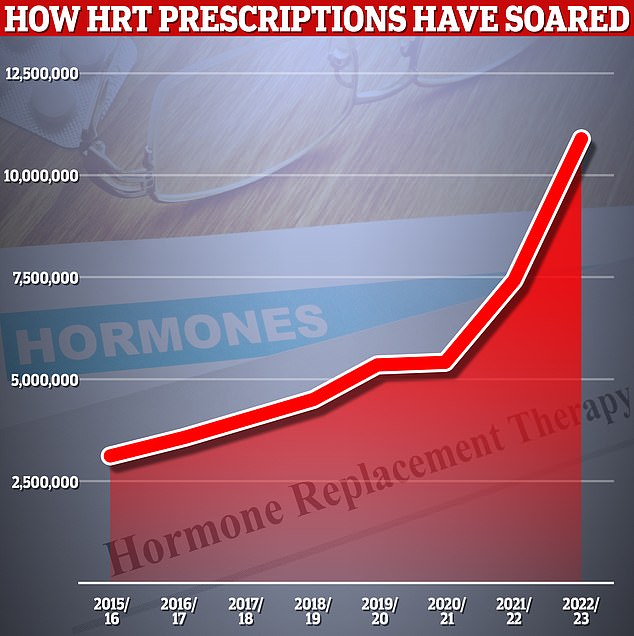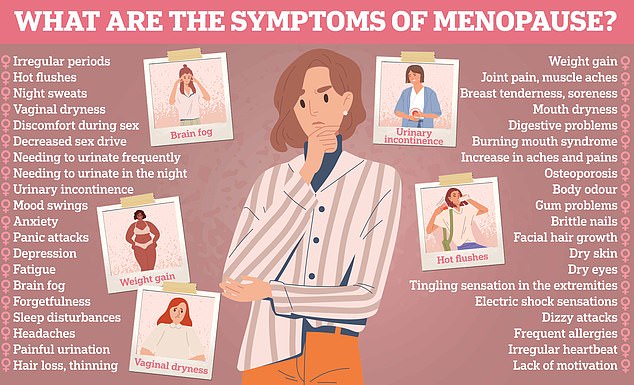NHS 'patronising' advice on menopause is too critical of HRT, says Davina McCall
NHS guidance for doctors on how menopause is diagnosed and treated is 'patronising' and overly critical of HRT, says Davina McCall.
The draft advice from the NHS treatment watchdog says that menopausal symptoms can be 'troublesome', that talk therapy should be used to manage hot flushes and that doctors should make the risks of HRT clear.
However, the TV presenter said the recommendations are 'incredibly confusing' and 'unbalanced' in their wording around hormone replacement therapy (HRT).
Davina has campaigned to raise awareness of the change and its treatments, sparking a menopause revolution and skyrocketing the number of HRT prescriptions.
The National Institute for Health and Care Excellence (NICE) is accepting submissions on its draft guidelines, which advise NHS medics on the treatment of menopause, until 5pm today and will then publish a final version in May.

Davina McCall (left) alongside Jane Cowl Senior Public Involvement Adviser at NICE as she delivers the Menopause Mandate's official response to new draft guidelines for menopause care in England


Official figures show that prescriptions for hormone replacement therapy (HRT) have increased by 47 percent compared to 2021/2022
Menopause Mandate, a campaign group of which Davina is a patron, issued its official response yesterday.
The submission reads: 'The language used to describe the symptoms of menopause and their impact is sometimes vague and patronising, including the use of 'bothersome' and 'bothersome'.'
It adds: 'Generally, there is a lot of emphasis on the risks of HRT and less on the benefits. Guidelines should be more balanced on the risks and benefits of HRT so that healthcare professionals can have a more balanced conversation with patients.”
HRT, which increases the levels of hormones that decrease with menopause, can help relieve symptoms such as hot flashes, night sweats, anxiety, reduced sex drive and memory problems.
Menopause Mandate also criticized the advice for recommendation cognitive behavioral therapy (CBT), a talk therapy, for hot flashes and insomnia.
NICE admitted there were some 'uncertainties' about its effectiveness against these symptoms.
Previous advice only recommended cognitive behavioral therapy for menopause-related 'depressed mood or anxiety'. As such, the watchdog stressed that CBT should be considered 'an option' for all patients rather than a 'routine treatment'.
The group said: 'There is no recognition that cognitive behavioral therapy may not be suitable for some people. There is a risk that GPs will only offer cognitive behavioral therapy and its availability through the NHS is very poor.'
The Menopause Mandate submission also called on NICE to be less gender neutral in its guidelines, labeling the document's use of the term 'people' as 'alienating'.
“The continued use of the word 'people' is reportedly alienating to many,” it said.
'It would be better to explain that the document is inclusive and intended for women, trans men and non-binary people registered as female at birth, but the vast amount of research has been conducted on women.'
The group also criticized the NICE guidelines for only 'briefly' mentioning how testosterone could help women during menopause.
Although traditionally considered a male sex hormone, women also naturally produce testosterone.
Levels can drop dramatically during menopause, contributing to a reduction in sex drive, but also an increase in fatigue and brain fog.
The draft guidelines only mention testosterone treatment as an option to reduce sex drive if other forms of HRT are ineffective.
Davina, who inspired thousands of women to try HRT after documenting her own experiences with menopause, dubbed the 'Davina effect', criticized the guidelines.
She said: 'I have to be honest, the draft guidance was incredibly confusing, and I think we have made changes that could help doctors so that they can really provide the kind of support that peri- and menopausal women need, and of course , to deserve.
'I was particularly concerned about the lack of balance in the wording around HST.
'We want to make it as easy as possible for our busy GPs to give us the right help and support we need.'


Menopause mandate chair Mariella Frostrup added: 'We feel strongly that the draft guidance is seriously flawed in numerous ways.
“It's as if the research of the past twenty years is being completely ignored.”
Responding to the Menopause Mandate submission, a NICE spokesperson said: 'The draft guidance makes clear that it is important that healthcare providers take a personalized approach when discussing treatment options, tailored to individual circumstances.
'The draft recommendations are based on the latest available evidence and we want it to provide a useful and actionable guide to inform these discussions.'
The spokesperson also defended the promotion of cognitive behavioral therapy as a treatment option for hot flashes.
'New evidence shows that cognitive behavioral therapy may help reduce symptoms of menopause, including hot flashes and night sweats, depressive symptoms and sleep problems,' they said.
'The draft guidance makes it clear that CBT can be considered alongside or as an alternative to HRT and sets out the risks and benefits of different treatment options so people can work with their healthcare provider to agree what works best for their specific needs.'
They added: 'We know there are strong opinions, and we welcome constructive challenges and a wide range of views as part of our consultation on this draft.'
Official figures show that the use of HRT has increased exponentially in England in recent years.
The latest NHS data shows that 11 million HRT prescriptions were given in 2022/2023, an increase of 47 per cent on the previous year. They were distributed to 2.3 million patients, an increase of 29 percent compared to the 2021-2022 period.
Demand was so high that Britain was hit by a shortage of certain HRT drugs.
Menopause is a normal part of aging and is caused by a drop in levels of the sex hormone estrogen.
It occurs when a woman no longer menstruates and can no longer become pregnant naturally.
In most women it starts between the ages of 45 and 55, but it can also occur earlier.
The symptoms, as well as their severity, vary.
Eight in ten women will experience symptoms such as hot flashes, night sweats, vaginal dryness, sleep problems, low mood or anxiety and problems with memory.
Women are advised to see their GP if their symptoms are difficult to control.
Treatments that doctors can provide are aimed at controlling symptoms and may include HRT.
